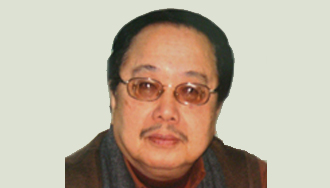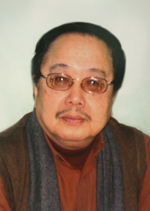
Associate Professor Bui Phung was born on March 21, 1936 in Chau Cau village, Thanh Liem, Ha Nam, and passed away on September 1, 2007 in Hanoi. The Bui Chau Cau family is a family of scholars, many generations passed the imperial examinations, and was approved by King Tu Duc:
"The world's number one family"
"Four generations of great scholars"
This family has produced Confucian scholars such as Bui Ky, Bui Bang Doan...

Associate Professor Bui Phung - famous lexicographer, Head of Vietnamese Department, Hanoi University of Science (1990-1994).Throughout his career as a teacher, translator and dictionary compiler, he was attached to the Vietnamese Department, leaving behind many valuable scientific works.
Associate Professor Bui Phung, due to family circumstances, lived with his grandparents since childhood. His grandfather was Mr. Bui Dong, an honest and upright mandarin. During his career as a mandarin, he was transferred to many places, from district chief, prefect... then Thai Nguyen governor. Later, he resigned from his position and returned to Ha Nam to live. During the resistance war against the French, he was elected Chairman of Lien Viet Ha Nam. Because Bui Phung followed his grandfather, he did not study at any fixed school as a child. Later, when he returned to Hanoi, he studied at Nguyen Trai School and Chu Van An School before being admitted to the Faculty of Literature, Hanoi University of General Science (now the University of Social Sciences and Humanities, Vietnam National University, Hanoi). He graduated from the first course in 1959 and was retained at the school as a teaching staff in the Vietnamese language department, later the Vietnamese Language Department, until his retirement. Coming from a family of scholars, and being tutored by his grandfather who was knowledgeable in Chinese and French, he was studious and focused on languages from a young age. In Northern Vietnam in the 1950s, English was not yet developed (if not discriminated against), so he was guided by his uncle, teacher Bui Y (one of the first people in Northern Vietnam to create an English-Vietnamese dictionary) to learn English on his own.
.jpg)
The work "Vietnamese-English Dictionary" by Associate Professor Bui Phung won the State Prize for Science and Technology in 2000.
He was one of the first three graduates of the first course, Faculty of Literature, Hanoi National University, assigned to the Vietnamese language department, the predecessor of the present-day Faculty of Vietnamese Studies and Language, to teach Vietnamese to international students.
He once wrote: “After graduating, most of my friends - who were students in the old city - were assigned to work far away from the capital. Only a few people stayed in Hanoi, I was lucky to be kept at the school, assigned to the Vietnamese language group for foreign students. The job at that time was not highly regarded and seemed to have no glory (according to the concept of most of the teaching staff at that time) because it was just teaching Vietnamese, not literature or anything like that. That was also the reason why some “scholars” at that time did not dare to say that they were in the Vietnamese Language Department.
Yet, like a mountain, I have done many things, useful for the country, for the school, for the faculty, I dare not say, but useful for me: this I can confirm. I have seen the Vietnamese Faculty grow, I once led the Faculty for a 4-year term. The Faculty has now changed and sometimes it is the dream of other Faculties in the school, now the University of Social Sciences and Humanities for many reasons..." (Page 12,30 years of Vietnamese Language and Culture Department for Foreigners, National Publishing House, Hanoi, 1998)
Throughout his career as a teacher, translator, and dictionary compiler, he was attached to the Vietnamese Language Department, leaving behind many scientific works. The Vietnamese language textbook for foreigners (commonly known as the K textbook, 1987) for which he was assigned by the Ministry of Universities and Vocational Secondary Schools, the School and the Faculty to be the editor-in-chief truly marked an important milestone in the compilation of Vietnamese language textbooks for foreigners in Vietnam. Since this communication-oriented textbook, subsequent books by other authors have been compiled in this direction. During his time as Head of the Vietnamese Language Department, from 1990-1994, he also edited the textbookVietnamese for foreigners(Education Publishing House, 1992) is very popular.
Not only did he teach Vietnamese to international students, he also taught English to Vietnamese people. There were families where both generations learned English with “Uncle Phung”. During the period of 1980-1985, he trained many English courses for young teachers in the Vietnamese department and from learning English, young teachers could communicate in English before the renovation period. Also from those English lessons, they learned from him the method of teaching a foreign language, teaching how to make learners listen and speak a language, and at the same time, they acquired from him the cultural capital of the previous generation of intellectuals that later generations could not have.
In the field of translation, he also left many important marks. Literary translation has brought him endless inspiration, so, in addition to teaching Vietnamese and English, he is a famous translator. Since the age of twenty, he and his uncle, teacher Bui Y, have translated famous plays such asMacbeth, Hamletby William Shakespeare. And many of his translations are well known asShogun (General)by James Clavell,A Woman of Substanceby Barbara Taylor Bradford,Godaan (Godan)by Indian writer Munshi Premchand...
However, what most generations of Vietnamese learning English or foreigners learning English learning Vietnamese remember him most is perhaps that he is a great lexicographer. He wrote dozens of large and small English-Vietnamese and Vietnamese-English dictionaries, but his massive "Vietnamese-English" dictionary, which was awarded the first State Prize for Science and Technology in 2000, is truly a monument in the bilingual dictionary system in Vietnam.
.jpg)
Late Associate Professor Bui Phung and the author of the article - Associate Professor, Dr. Nguyen Thien Nam (Head of the Department of Vietnamese Studies and Language, University of Social Sciences and Humanities, Hanoi)
This Vietnamese-English Dictionary was first published by Hanoi University of Science Publishing House in 1978. After 30 reprints, the number of entries has increased from 15,000 to more than 350,000 with 2,301 pages. This dictionary fully meets the needs of a large number of users in almost all fields: Culture, art, science, economics... as well as in daily life. At the time this dictionary was awarded the prize, and after several more reprints before the author passed away, and even until now, this is still a Vietnamese-English dictionary that is evaluated by the scientific community as having accurate definitions, rich coverage of word layers, both ancient and modern, able to meet the needs of users, and is the largest and most useful Vietnamese-English dictionary in Vietnam as well as in the world.
He based on the isolated characteristics and analyzed the nature of Vietnamese to make statistics and give appropriate equivalent words in English. In the introduction to the 2000 edition, he also believed that: "The purpose of a dictionary maker is not to set rules or regulations, but simply to record and point out some words that have been used and how they are being used" (page 9) and "It is impossible to just give"plane"without"airplane", "helicopter"withouthelicopter(page 10).
Thanks to this, we can see that there are wordsway(ling.) isolate, p. 221, also found fromisolatedisolating, p. 692 (a term commonly used in linguistics). We can also see modern economic terms such as:dystonia(econ.) low inflation,deflation(currency or economy) deflate, disinglation, deflation, p. 1889. Those interested in classical literature may also find the entryboth laughlaugh (loud/boisterously); shout with laughter;look at each other and smile(Kieu) eyes locked laughing, p. 218. The author also included popular slang, for example:friend(slang) side;rub with...side with..., page 218.
In addition, many local words from the North, Central and South were also carefully selected and included by him.
In terms of application, the dictionary has been widely used domestically as well as internationally, contributing effectively to the integration process and international exchange of Vietnam in many fields such as education, research, politics, economics, science, culture, art... There was a period when computer dictionaries were not as developed as they are now, most of the bookshelves of Vietnamese scientists and international scientists interested in Vietnam, centers, libraries of large and small universities in the world all had this Vietnamese - English dictionary. Later computer dictionary makers basically relied on the author's original word list to compose the software.
Widely used in Vietnam, the "Vietnamese - English Dictionary" was also licensed by the British publisher Longman, and the University of Hawaii (USA) has made it into computer software... contributing to cultural exchange, foreign trade, diplomacy and learning English and Vietnamese.
In the introduction to the 1995 edition, reprinted here, Dr. Jayn Werner, Department of Political Science, Long Island University and Columbia University, comments:“This is a quick, easy-to-use and very practical dictionary. It is designed for beginning students as well as for experts on Vietnamese culture and civilization.".
It can be said that his Vietnamese-English dictionary has made important contributions to Vietnam's integration process with the world, contributing to improving people's knowledge, especially after the Doi Moi period, and even up to now, when there has not been a Vietnamese-English dictionary that has created a greater influence in terms of science and usage value.
In a flash, he left this world for 8 years, the pages he left behind were enormous: Vietnamese textbooks for foreigners that paved the way for a new trend, classic translations with Vietnamese writing style that seemed to be unbeatable, dictionary pages that for a long time, without which, Vietnamese people would find it much more difficult to learn English or foreigners would find it much more difficult to learn Vietnamese. Bui Phung deserves to be called a talented teacher and a famous lexicographer.
Hanoi June 2015
|
ASSOCIATE PROFESSOR BUI PHUNG
+ Working unit: Faculty of Vietnamese, Hanoi University of Science, now Faculty of Vietnamese Studies and Language, University of Social Sciences and Humanities, VNU. + Management position: Head of Vietnamese Department, Hanoi University of Science (1990-1994).
Course materialVietnamese for foreigners(2 volumes) (editor-in-chief) Ministry of Universities and Vocational Secondary Schools Publishing House, Hanoi, 1987. Course materialVietnamese for foreigners(editor-in-chief), Education Publishing House, Hanoi, 1992. Nearly 100 works have been published: English - Vietnamese Dictionary, Vietnamese - English Dictionary, American - Vietnamese Dictionary, Various English tool books, nearly 35,000 pages.
+ The first State Prize for Science and Technology in 2000 for the projectVietnamese – English Dictionary (1978). |
Author:Associate Professor, Dr. Nguyen Thien Nam, Bui Vu Minh